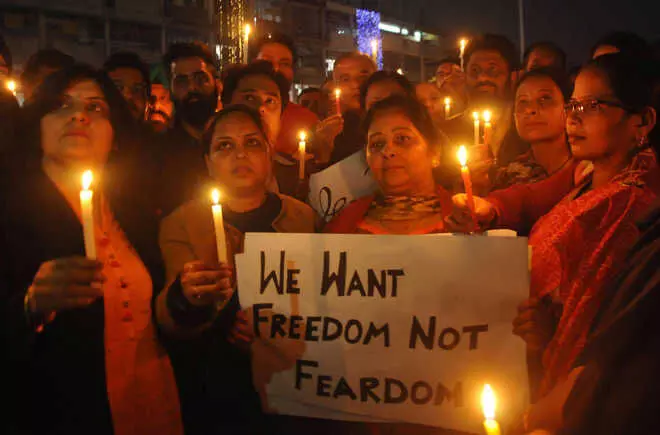TRENDING TAGS :
What Good Is Candlelight?
India continues to grapple with horrific crimes against women despite stricter laws and national outrage. Is our silence enabling rapists?
The horrific rape and murder of a doctor at a government medical college in Kolkata in 2024 shook the entire country. Doctors across India protested and went on a long strike. People were enraged; a storm of anger, sorrow, and disbelief had swept all across the nation. More than anger, what truly dominated was a profound sense of helplessness and despair. But all that anger and sorrow evaporated as fast as it had erupted. The focus quickly went upon other issues and people forgot the RG Kar episode.
A Timeline of Repetition In 2012, a brutal crime occurred inside a moving bus in Delhi. It came to be known as the Nirbhaya case. The entire country was seething with rage. In response, stricter laws for women’s safety were enacted. For a brief moment, we believed that fear of harsh punishment would restrain these monsters. But, nothing changed. Thirteen years later, we are in the same place—or perhaps even deeper in the abyss.
The Alarming Numbers
According to the National Crime Records Bureau, there has been a significant rise in crimes against women in India. In 2022 alone, 445,256 cases were registered—equivalent to about 51 FIRs per hour. This marks a sharp increase from previous years. In 2021, there were 428,278 cases, and since 2016, there has been a 26.35% increase in crimes against women. In 2021 alone, 31,878 rape cases were reported. And these are just the reported numbers. We all know how many go unreported.
Words and Speeches—But No Action
Back in 2014, Prime Minister Narendra Modi, in his first Red Fort address, expressed his anguish over such crimes. “When we hear of these rapes, our heads hang in shame.” In 2021, he urged citizens to change their mindset toward women, and rid society of all behaviors and attitudes that disrespect them. In 1998, after the gang rape of three nuns in Jhabua, Madhya Pradesh, then Home Minister L.K. Advani addressed Parliament, stating that the existing laws were insufficient, and proposed the death penalty for rapists. Yet, nothing has changed.
The Illusion of Justice
Perhaps the perpetrators of the Kolkata case will be given the harshest punishment. But will anything truly change? Unlikely. Even if they are hanged, what difference will it make?
The Root of the Problem
Because the real issue isn’t just one incident, or one criminal, or the severity of one sentence. We’ve seen all this before. The real problem lies in our society, in our systemic failure, and in our collective behavior.
Victim-Centric Narratives, But No Accountability
We all remember the victims—Nirbhaya, Abhaya, and others. We’ve seen their grieving families on television and in newspapers. We’ve seen photos of their homes, their grief. Journalists have crowded their doorsteps. But what about the perpetrators? Do we ever learn about who they were, where they came from, what kind of families raised them, what lives they led? Do governments, police, media, or courts ever put their lives under the spotlight? Do they say—“Here is the monster who committed this heinous crime”? We hear all about the victim—perhaps to generate sympathy. But why don’t we cultivate disgust and revulsion for the criminal? Why don’t we name and shame them publicly? Courts have rightly banned revealing victims’ identities—but there’s no law stopping us from naming rapists. Then why do we impose this silence ourselves?
Public Shaming: A Necessary Step?
Yes, Mahatma Gandhi said, “Hate the sin, not the sinner.” But how long will we continue this idealism? Why don’t we publicly shame rapists once they are convicted? Why not socially ostracize them? Why not ensure that even the most powerful perpetrator is humiliated for life? The victim and her family carry lifelong scars. Then why should the criminal remain anonymous, safely hidden from society’s wrath?
Changing the Mindset, Not Just the Law It’s time to reflect. From Raja Ram Mohan Roy’s reforms to today’s “Beti Bachao” campaigns, we’ve come a long way. Yet, we focus on teaching our daughters judo and karate— Why not teach our sons discipline, empathy, and respect for women?
Justice Must Be Swift and Relentless L.K. Advani once argued for capital punishment for rape. But even he later admitted: “Even if every crime is punishable by death—what’s the use if the criminal is never caught?” What matters is: Swift arrests, Speedy trials, Timely and Exemplary justice. Otherwise, laws are meaningless. In Arab nations, rapists are beheaded. In the U.S., sentences can run up to hundreds of years. But have such crimes disappeared from those societies? Punishments have existed since time immemorial— but crimes never stopped.
The True Solution Lies Within Us Why? Because laws are not enough. The solution lies within us—in our mindset, in our social will. We must shun the families of such criminals. No matter how powerful the rapist, we must expose them. We must build an atmosphere where even the relatives and friends of a rapist are forced to disown them. There was a time when social policing was strong. It held people accountable. Unless we revive that—there will always be another Nirbhaya, another Abhaya, somewhere.
And Us?
We’ll keep marching with candles. Useless candlelights which lighten no one.
(The author is a journalist)


